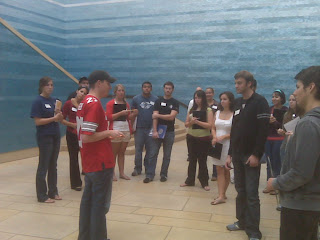 Course Syllabus: Scientific Investigations and Their Development
Course Syllabus: Scientific Investigations and Their DevelopmentPBL: pp 83
n Beginning = DQ
n Finish = Project
n List or include milestones, pieces of project, drafts etc.
You may want to write each component of the map on a post it and have the ability to rearrange as you go.
q Visit “Theory Behind Concept Map Making…” site first,
http://cmap.ihmc.us/Publications/ResearchPapers/TheoryCmaps/TheoryUnderlyingConceptMaps.htm
q Go to http://cmap.ihmc.us/
n Download CMAP tools to use in creating your draft concept map for your Driving Question
Picture: Student work from Sept 30, 2009


